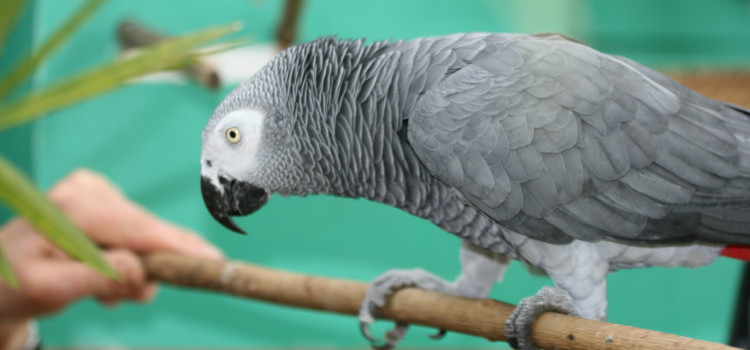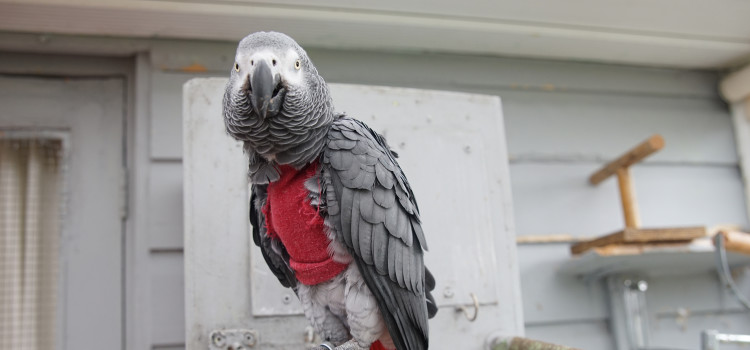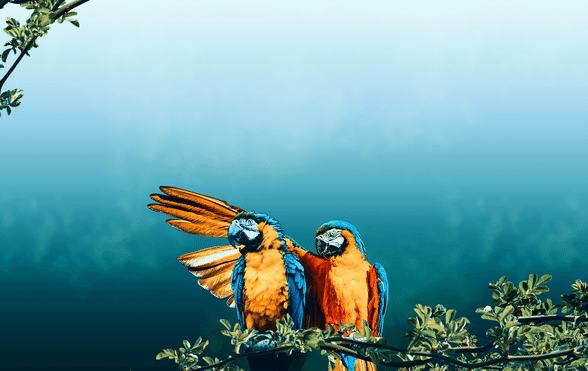How do you stop your parrot from feather plucking or biting, and why do they do it?
Is your parrot insured? Get a quote for up to £5,000 of vet fee cover, death and theft cover | We’ve been insuring exotic pets since 1996 | Check out our customer reviews on Feefo.
Why is my parrot plucking its feathers? | About biting in parrots | Reasons for parrots biting | Nesting parrots and biting | Ways to reduce risk | Other reasons for biting | Help! I got bitten | Training | Beaking | Strategies to prevent biting |
Feather plucking in parrots
From African Grey parrots to Macaws if your parrot begins feather plucking it can be very distressing for you. Trying to stop it can also be a challenge.
Feather plucking is a problem of captivity. You can tell if your bird is plucking or snapping off the tops of its feathers as you will see bald patches or stumps.
The difference between plucking and a normal moult is that moulted feathers are shed two by two over a time. You won’t notice any missing unless you look for the new ones encased in their keratin sheath gradually appearing.
A tame bird will often allow its human friend to preen the keratin off the growing feathers.
Why is my parrot plucking its feathers?
The first thing to do if feather plucking occurs is to eliminate any physical cause. These can include:
- Disease
- Parasites
- Allergies
- Skin infections
- Diet
If nothing shows up from blood tests and physical examinations at the avian vet, you have to look for environmental causes.
Environmental causes of feather plucking in parrots can include:
-
- Your parrot feeling bored: Parrots are very intelligent. You should provide plenty of toys and stimulation, in order to prevent them getting bored.You should play with them regularly, and let them get plenty of exercise.You should also consider leaving a radio on if you go out, so that they don’t get lonely.
-
- Overstimulation of your parrot: If your bird is overstimulated, for example, she lives in a very noisy house, where there’s little chance for rest, she could be overtired, and over stimulated. This could also lead to feather plucking. You should try to move the bird to a more relaxed area.
-
- Exposing your parrot to too much light: Too much light can overtire a bird, overstimulate her or encourage frequent moulting
-
- Exposing your parrot to too little light: Too little light could lead to poor feather quality
- Handling your bird with nicotine stained fingers: Yes, this can irritate your bird, as it could irritate your parrots skin – meaning she’ll preen and pull at her feathers to relieve the itch
- A dusty atmosphere and your parrot: A dry dusty atmosphere could lead to your parrots feathers becoming dry and brittle. This will irritate your bird.
Environment causes provided by the Parrot Society website
Plucking can become like nail biting in humans – a self-comforting bad habit that becomes habitual.
At its worst, a plucked bird resembles an oven-ready chicken. If plucking persists too long the follicles are damaged and the feathers cannot regrow.
An avian vet should be able to help you discover what has changed within the environment to make the bird pluck itself.
Two birds who board here regularly are Andy Umbrella cockatoo and Max Grey. They are sole parrots who spend time alone. Neither pluck scream nor bite. I put that down to the fact that they are integrated, beloved members of their human flock.
About biting in parrots
Biting is not an insoluble problem. It is not natural behaviour for parrots. In most cases, it arises because of misunderstanding between parrot and caregiver – not innate bad behaviour from the parrot.
“Watch clips of wild parrots, or if you live near a flock of semi feral Ring Necks watch them. You will see plenty of vigorous activity in the flock or between two individuals. You might even get to see a fight over a nest site.
What you won’t see is one parrot latching onto another one and inflicting a painful bite: the about-to-be-bitten bird instead flies off.”
Wild parrots understand one another through a variety of calls and body language.
Their captive bred cousins cannot imitate this behaviour with most of their non-flighted carers, or even birds of another species that in the wild would never have met.
If your parrot has begun to bite, don’t blame her. You need to analyse the possible causes; there may be more than one. Once you are establishing credible reasons, you can start looking for solutions.
“My own experiences….My own single serious bite in nearly twenty years was exactly that. I looked into a nest box thinking the parents were farther off in the aviary. The Timneh male latched onto the bridge of nose and held on. Completely my fault.”
Is your parrot insured? Get a quote for up to £5,000 of vet fee cover, death and theft cover | We’ve been insuring exotic pets since 1996 | Check out our customer reviews on Feefo.
Alternatively you can call us on 0345 982 5505
Reasons for parrots biting
From African Grey’s to Macaws, parrots share common reasons for biting. These include:
- Fear
- Frustration
- Mating behaviour
- Over-bonding
- Territorial behaviour
- Phobic behaviour
- Over-stimulation through too vigorous playing or too much body stroking.
More reasons for parrots biting
- You changed your hair style
- You wore a hat I have not seen
- You touched my cage without permission
- You tried to fill the food bowl
- You moved too fast – only monsters move fast
- You have a chin hair that needs taking off
- You asked for a step up with the wrong hand
- You told me to go to bed
- You kissed that horrible person while I was on your shoulder
How fear can cause your parrot to bite
Parrots are hard-wired to fly away from anything that alarms them.
A wing clipped bird for example could be more prone to biting.
This is because wing-clipping makes the environment a far more fearful place for a bird that is prevented from using her instinct to flee from perceived danger. She then learns to bite at it.
There still remains controversy that wing clipping aids taming and training. Anti-clipping ideas are gaining ground however. Even in USA where clipping was the norm, the practice is lessening though still widely used.
| Here’s a case study of a parrot biting through fear:
An African Grey was consistently biting the woman who had taken him over from a miserable existence (seven years in a cage left in a corridor).
I was asked to visit and help. Bingo, a handsome non-plucked Grey, was in a large cage in the sitting room. The woman opened the door stretched out her hand towards him. Bingo shuffled away along the perch.
The hand followed. Bingo had nowhere else to go; he lunged. The woman withdrew her hand, slammed shut the door and said crossly. ‘You see how unfriendly he is. I can’t even take him out of the cage.’
She was not interested in my suggestion that instead of trying to force Bingo to accept her, she could follow the signals he was giving her with his body language which were, ‘Leave me alone.’ He was showing her as well as he could.
She gave Bingo to me, convinced that he was a ‘bad bird.’ I let him free in my bird room; I did not put him in a cage. Although unclipped, after the seven caged years of his previous life he could not fly.
I ignored him totally apart from cheerful greetings. After some weeks watching my Greys, Artha and Casper and Perdy cockatoo fly down to my hand and get a treat, he began to copy them, perching just above my head and stretching down to take a nut.
I trained him to step up onto a stick because he seemed afraid of hands.
Within five months, he had fitted into our flock, stepping into a crate to go into the aviary and flying about with increasing agility. He even learned to play with Artha.
|

How overbonding can cause parrots to bite
Captive birds who become over bonded to one family member have a hard time in captivity.
In the wild the mated pair would be living with the flock but separating from them in season, finding a nest hole, laying eggs, bringing the chicks up to fledgling and then rejoining flock life before starting over again next season.
You can see how overbonding can affect a birds mating behaviour in Joanna Burger’s book, “The Parrot Who Owns Me”: She describes how Tiko, the red lored captive bred Amazon joined her and her husband at the mature age of twenty five.
The parrot lived amiably with them except in the mating season when he‘d try to entice Joanna into the nest spaces he had discovered under furniture and would attack her husband if he approached.
The Burgers understood the reasons for Tiko’s behaviour. And while he was in this hormonal state, Michael would avoid him.
Once the mating season was over, Tiko and Michael were close friends again.
How to lessen mating behaviour in your parrot
There are some precautions to take to lessen the mating behaviour of a bird living in a human flock.
These are:
- Avoid too rich a diet
- Give the bird less hours of daylight
- And most the successful is instituting a training programme that gives the bird something to think about.
What to do if your parrot bites you
When a parrot bites a vicious circle can arise. The parrot bites. You draw back in alarm and show fear. Parrots are prey not predators. Sensitive as they are to both the moods of other birds and of other animals like us, if they sense that you’re afraid, they can also become afraid.
When a bird bites you:
- Stop doing whatever it was they did not like. Repeating the action encourages them to bite again.
- Don’t shout, hit or squirt with water. Don’t cover the parrot cage. None of these will stop her from biting. Indeed it may encourage it.
- If your parrot wants your hand out of the cage, take it out.
- Don’t make a lot of noise by shouting, swearing or exclaiming. That’s drama and birds like drama. Easier said than done. Those beaks are painful. If you can’t detach yourself from the beak quietly you are encouraging a repetition.
- The neatest way to stop a parrot biting is to avoid the situations where a bite occurs. Now this can have a sad outcome.
The carer is afraid of being bitten, so leaves the parrot for too long in his cage. This can become so traumatic for the parrot that she may develop other unwanted behaviours such as plucking and screaming.
Ultimately, don’t react to her biting and keep calm. You can then move onto methods to prevent it happening again.
How to stop your parrot from biting you
Training: Punishment is not the best solution. Understanding what a parrot wants helps. Training works best when the parrot is eager for food. Not starving but interested in your treats.
A few minutes of step up training, recall training or trick training before the bird’s breakfast or in the evening if you have removed the food bowls can work wonders.
Training workshops are a good idea. However, if you cannot get to these to see good training in practice, Barbara Heidenreich’s DVDs show her using positive reinforcement techniques with ordinary pet parrots. Notice her calm demeanour and how the birds respond to her.
Reduce boredom in your parrot: Some parrots’ cage or aviary are too bare. They encourage biting behaviour.
All birds need to chew to a greater or lesser extent. Yet far too many birds have too little wood, cardboard or safely destructible items to prevent boredom and frustration.
If you own breeding birds, then this is less of an issue. Since breeding birds are rarely much handled, that they aren’t tame is less of a drawback than with parrots in the home.
You should also provide plenty of toys that will stimulate her, give her plenty of time out of her cage and make sure she’s not left alone for long periods.
Preventing birds from biting each other
An obvious way to prevent your birds from biting each other is to keep only one bird. I think that gives the bird a less enviable lifestyle since birds are flock animals.
That said a single bird who is well adjusted within its human flock can have a rewarding life. There are no hard and fast rules as to which bird will get on with another.
Gracie, my friend’s Grey adored her partner Chip’s budgie. The two would perch together with the Grey’s wing sheltering the small blue bird.
My Benni’s younger brother Kovu free flies with a female Amazon. He can be seen holding a protective wing over his smaller friend. But Ryan the owner had to rehome his Grey because Kovu started to harass him.
And remember that one swallow doesn’t make a summer. Nor does one bite produce a biter.
Beaking – when your parrot nips
Avian beaks are far more sensitive than we often realize. Watch how a Macaw will feed her tiny chick, using her enormous beak to gently place chewed up food down the baby’s throat. Once the baby fledges she will use her own beak as an extension of her sensitive claws. This can become a problem if misunderstood.
The same thing occurs with young birds. They can become far too over excited. Think of tired toddlers throwing tantrums. And remember a feathered toddler has a can opener fixed to the front of its face. In the case of Amazons species, you’ll see the eyes pin and the tail feathers flare out. When you see that, it’s time to rapidly cool the play session down.
Benni my blue and gold Macaw started to play at five months. He began to nip quite hard once the game was underway. My solution was as soon as he saw his beak opening too wide, I stuffed one of his soft toys into the gap and he nipped that.
Now that he is older I can say ‘Be gentle,’ and he understands.
Alternatively you can call us on 0345 982 5505

Is your parrot insured? Get a quote for up to £5,000 of vet fee cover, death and theft cover | We’ve been insuring exotic pets since 1996 | Check out our customer reviews on Feefo.
Alternatively you can call us on 0345 982 5505

